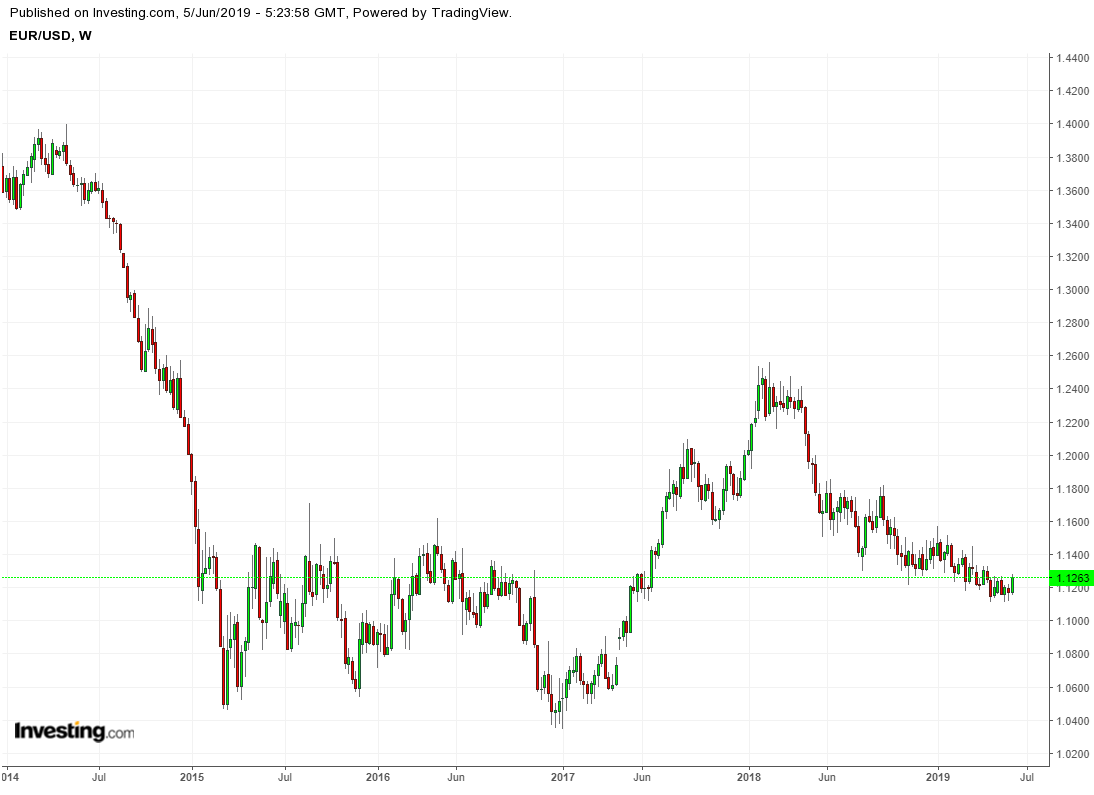For most of recent history, when the European Central Bank's (ECB) policymakers meet, the euro falls. But the odds of the single currency breaking that streak tomorrow are looking better by the day. The main reason for this, analysts say, is that President Mario Draghi and the rest of the bank’s governing council will struggle to outdo the extremely pessimistic scenario already reflected in foreign exchange and debt markets.
Yields on 10-year German government bonds, the eurozone’s benchmark safe asset, hit an all-time record low of -0.22% on Tuesday, while those on Portuguese and Greek equivalents are also at record lows. The notorious ‘5Y5Y inflation swap’, the ECB’s preferred market measure of inflation expectations, dipped to within 3 basis points of its all-time low of 1.25% on Tuesday.

The euro itself has flirted with a two-year low against the dollar in the last couple of weeks. And the most recent business surveys—especially for Germany, the region’s biggest economy—suggest that the better-than-expected growth in the first quarter may have been a flash in the pan.
The ECB isn’t expected to change its official rates at the meeting, which will take place in the Lithuanian capital of Vilnius. However, it is under pressure to do something to mitigate the effects of a worsening trade war between the U.S. and China, something it has already identified as the biggest risk to the region’s economy.
The two easiest options to loosen monetary policy would be to push back, beyond the end of this year, the earliest date for its first interest rate hike of the cycle (at least until March 2020, says Nordea’s chief analyst Jan von Gerich). The second would be to pre-announce the terms of the ECB’s new “targeted long-term refinancing operations,” or TLTROs, which are due to start in September.
In its last round of TLTROs, the ECB incentivized banks to lend to the real economy by tying the rate it charged to the amount of new loans created by the banks. A similar mechanism could take the effective rate on the new TLTROs as low as the ECB’s -0.4% deposit rate, according to ABN Amro chief financial analyst Nick Kounis. This “could be seen as credit easing,” analysts at Morgan Stanley agreed in a research note.
However, it’s not clear that the central bank will want to be so generous, so soon. The accounts of the ECB’s last meeting suggested that there was no agreement yet on whether the TLTROs should be used to ease policy, or simply to provide a backstop for banks struggling to meet a relatively new rule on minimum liquidity levels. Nor has an internal review into the side-effects of negative ECB rates on the financial sector been concluded yet (although ING’s Carsten Brzeski points out that April’s Bank Lending Survey suggested the banks coped pretty well with them, which would remove an obstacle to further easing).
The bank could create a pretext for easing policy by again revising down its growth and inflation forecasts for the next two years. However, it already slashed its 2019 growth forecast to 1.1% from 1.7% in March, and another big revision could be controversial, since it would be based on assumptions about the U.S.-China trade dispute that would boil down to guesswork. It’s unlikely that the ECB’s new chief economist, the Irishman Philip Lane, will want to make his mark that way.
In any case, there will be opposition to any fresh attempts to ease policy. Deutsche Bundesbank President Jens Weidmann said less than two weeks ago that he didn’t see any reason to change policy. The eurozone’s first-quarter GDP did, after all, come in at a decent 0.4%, above expectations.
“There is a risk that the ECB may not be as dovish as the market is expecting,” said Rabobank currency analyst Jane Foley.
“While this could lift the EUR in the short turn, the negative implications for Eurozone growth are likely to cloud the outlook for the EUR in the medium-term term and limit upside potential for EUR/USD into 2020 and beyond.”
